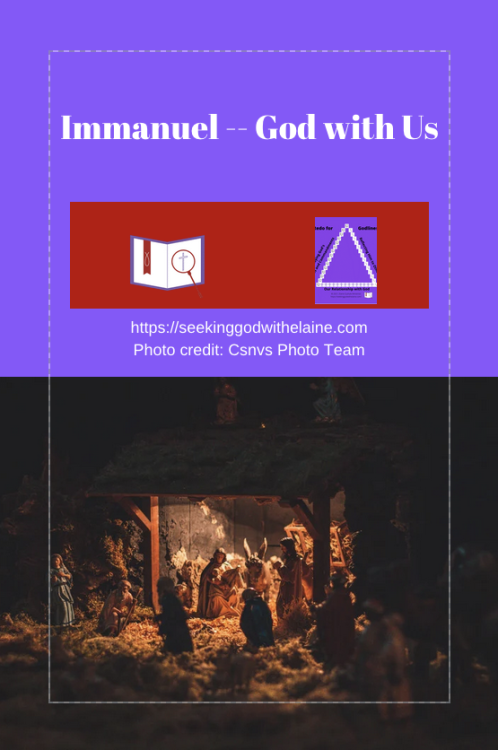Jesus was the Messiah God promised all the way back in the Old Testament. This daily devotional looks at how God’s presence changed after Jesus was born.
Nuggets
- God with us in the Old Testament
- God with us in the New Testament and today.
Devotions in the 2021 Christmas series

I am so lucky to have a fiancé who is a pastor. He also likes to write and support me.
Pastor Steve has written three great devotions for our Christmas series this year. Let’s jump into the first one.
You may or may not be aware of it, but the Old Testament has many prophecies regarding the birthday of the Messiah. It even goes so far as to tell us what His name will be or what He will be known as.
All the prophecies regarding the Messiah coming have come true, fulfilled by Jesus, except for one. That one is His second coming to gather His church into heaven.
An entire post could be written on that subject alone; however, it is outside of what this one is about. We will save that subject for another time.
Let’s keep in mind, as we go through this devotion, that there is a big different between God being “with us” when He came upon people in the Old Testament, compared to God being “with us” when we are filled with his Holy Spirit. He abides IN us as described in the New Testament.
God With Us in the Old Testament
In the Old Testament times, for people to experience “God with us” was to have God be “with them” much like the Israelites experienced when God lead them out of Egypt. Here He appeared to them as a pillar of cloud by day or a pillar of fire by night (Exodus 13:21) or, if God had a reason to empower a person for his glory, much like He did with Elisha where the Bible says, “… the Spirit of the Lord came upon him.” (Judges 3:10).
God With Us in the New Testament and Today
In New Testament times, after the Baptism of the Holy Spirit came upon the disciples, (see in Acts 2:4 where it says, “Everyone present was filled with the Holy Spirit…”), God with us takes on a different meaning. He is living inside of us through the Holy Spirit (if we have received Jesus as Lord and Savior).
Also, God continually lives within us as long as we live and walk in Him. Walking is the term used to describe how we live our lives.
Compared to Old Testament times, God remained upon someone as long as He needed the individual for His purposes. He didn’t remain upon the person for as long as he lived, however.
“‘Behold, the virgin shall conceive and bear a son, and they shall call his name Immanuel’ (which means, God with us)” (Mt. 1: 23 ESV)
This verse in Matthew 1 is a direct quote of Isaiah 7. It is meant to be a reminder of the Old Testament prophecies regarding the birth of Jesus. It is also a confirmation that Jesus is the Messiah that was prophesied about.
Why was Jesus’ birth such an important event? The coming of Jesus to earth was a promise of God.
This promise is recorded in Isaiah 9: 6. “For to us a child is born, to us a son is given; and the government shall be upon his shoulder, and his name shall be called Wonderful Counselor, Mighty God, Everlasting Father, Prince of Peace” (Isa. 9: 6 ESV).
Why was it so important that it was prophesied about hundreds of years before it happened? It was out of love for us that God made a way for us to be with Him for eternity. With the recorded prophecies in the Old Testament about Jesus’ birth, God is reminding us that He indeed was coming and indeed did come.
“For God so loved the world, that he gave his only Son, that whoever believes in him should not perish but have eternal life” (Jn. 3: 16 ESV).
God’s love for us was the reason that Jesus came. Jesus came to this earth to pay the price of our sins so that we did not have to pay it ourselves.
In fact, it was a debt that we owed, but we could not pay. We did not possess the correct “currency” to pay that debt.
And the amazing thing about it all is that we do not have to wait until we get to heaven to experience God with us. We can experience it each day.
“Beloved, let us love one another, for love is from God, and whoever loves has been born of God and knows God. Anyone who does not love does not know God, because God is love” (I Jn. 4:7-8 ESV)
We see in this passage of scripture the source of a Christian’s love. It is the outworking of our love for each other.
It comes from our love for God. His love for us is His greatest gift to us, shown in the gift of Jesus coming to the earth.
God is love – the source and embodiment of all love. This concept and the concept that “God is light” form the foundation on which John writes this letter of 1 John.
“In this the love of God was made manifest among us, that God sent his only Son into the world, so that we might live through him. In this is love, not that we have loved God but that he loved us and sent his Son to be the propitiation for our sins” (I Jn. 4:9-10 ESV)
Jesus Christ, sent from God the Father, embodied and demonstrated God’s love in His life on earth. It was also evident in His sacrificial death on the cross as an atoning sacrifice.
“Beloved, if God so loved us, we also ought to love one another. No one has ever seen God; if we love one another, God abides in us and his love is perfected in us” (I Jn. 4:11-12 ESV)
Those who have received God’s love cannot help but spontaneously love those who do the same. As this love flows through us to each other, it becomes evident that we love God.
“By this we know that we abide in him and he in us, because he has given us of his Spirit. And we have seen and testify that the Father has sent his Son to be the Savior of the world. Whoever confesses that Jesus is the Son of God, God abides in him, and he in God” (I Jn. 4:13-15 ESV)
Those who believe in Christ have God living in them, and they live in God (GOD IS WITH US!). The Father and the Son experience this fellowship with us.
Experiencing God in this way is a special privilege for believers.
“So we have come to know and to believe the love that God has for us. God is love, and whoever abides in love abides in God, and God abides in him. By this is love perfected with us, so that we may have confidence for the day of judgment, because as he is so also are we in this world” (I Jn. 4:16-17 ESV)
Our love grows more perfect. The Greek word translated grows more perfect does not mean flawless, but it means mature and complete.
We mature as our relationship with God grows, and God’s love makes our love complete. Experiencing and expressing God’s love and doing what it requires does not make us acceptable to God, but it does give us the assurance that we have been accepted and our fears of the final judgment melt away.
“There is no fear in love, but perfect love casts out fear. For fear has to do with punishment, and whoever fears has not been perfected in love” (I Jn. 4:18 ESV)
Perfect love expels all fear. As we live with Christ and grow more mature and complete in God’s love, we have confidence in facing the day of judgement, which will be terrifying for those who don’t know God.
Based on consciousness of guilt, fear anticipates a deserved punishment, producing dread that is itself a foretaste of that punishment. Christ died to set us free from this dread.
“We love because he first loved us” (I Jn. 4:19 ESV)
We love each other: literally “we love.” Other manuscripts read “we love God”; still others read, “we love Him.” God loved us first, while we were still sinners, not only after we gave up sin.
Romans 5:11 says, “More than that, we also rejoice in God through our Lord Jesus Christ, through whom we have now received reconciliation” (ESV).
God started the process. When He loved us, He enabled us to respond to Him in love and to extend that love to other Christians.
“If anyone says, ‘I love God,’ and hates his brother, he is a liar; for he who does not love his brother whom he has seen cannot love God whom he has not seen” (I Jn. 4:20 ESV)
If someone says: “I love God but hate a Christian brother or sister,” he is a liar! It is impossible for us to love, as God loves us, and hate a brother or sister.
“And this commandment we have from him: whoever loves God must also love his brother” (I Jn. 4:21 ESV)
He has given us this command: Those who love God must also love their Christian brothers and sisters. It is not a suggestion or something that we are left up to decide for ourselves. We are required to love our brothers and sisters in the Lord!
What does all of this tell us? We can know that God is with us, and we can know that Jesus is that God with and within us through the work of the Holy Spirit.
The fact that we love shows that God is with us. Also, we can know God is with us because we love one another.
Father God, in our daily walk with you, help us to see and be aware of the many ways that you are Immanuel – God with us. As we begin each new day, help us to be mindful of looking for you in all that we do. Amen.

What do you think?
Leave me a comment below (about this or anything else) or head over to my Facebook group for some interactive discussion.
If you don’t understand something and would like further clarification, please contact me.
If you have not signed up for the email daily or weekly providing the link to the devotions and the newsletter, do so below.
If God has used this devotion to speak with you, consider sharing it on social media.